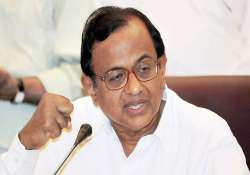NCTC An Absolute Necessity, Says Chidambaram
New Delhi, Mar 13: Home Minister P Chidambaram today asserted in the Lok Sabha that NCTC was an "absolute necessity" and not an attack on the federal structure and maintained that even states opposed to

New Delhi, Mar 13: Home Minister P Chidambaram today asserted in the Lok Sabha that NCTC was an "absolute necessity" and not an attack on the federal structure and maintained that even states opposed to some provisions of the body support its formation.
Members expressed concern during Question Hour over formation of NCTC in its present form and how it seeks to take away powers of the states thereby attacking the federal structure.
Allaying these fears, Chidambaram said the issue can be debated (in Parliament and outside) and NCTC would come into force after looking into the suggestions of the states.
"I believe the NCTC is an absolute necessity. A number of states have supported its formation .... I do not believe it violates the federal structure," Chidambaram said, adding even states that have expressed concerns support the formation of NCTC with some changes.
The Home Minister said a meeting of Chief Secretaries and DGPs of states was held yesterday to discuss the NCTC issue and a meeting of Chief Ministers - which was postponed earlier due to Assembly elections - will be held on April 16.
Chidambaram denied reports in a newspaper that the Union Home Secretary had asked Chief Secretaries and DGPs in yesterday's meeting not to act like stenographers of their state governments. Leader of the Opposition Sushma Swaraj had raised this issue in the House.
UPA allies TMC and NC have expressed concern over NCTC. TMC member Kalyan Banerjee said in the House that the Centre is trying to encroach upon rights of states and this had been seen in the case of Lokpal and Lokayukta Bill too.
"This type of scheme (NCTC) should not be brought. This scheme should be withdrawn immediately," Banerjee said.
Chidambaram said some of the chief ministers had written to him raising their concerns over NCTC and he had replied to them.
In his written reply, the Home Minister said Chief Ministers of Odisha, West Bengal, Madhya Pradesh, Tamil Nadu, Gujarat, Tripura, Himachal Pradesh, Jharkhand and Karnataka had written to the Centre about the NCTC order encroaching upon the domain of the states and expressing the need for consultations with the state governments before NCTC is operationalised.
"The concerns expressed are mainly about Section 43-A (of Unlawful Activities Prevention Act) and the powers of the Standing Council," Chidambaram said.
The states have asked the Centre to specify the circumstances in which Section 43(A) of the Unlawful Activities Prevention Act (UAPA) can be invoked. Section 43(A) of Act gives an officer power to arrest and search.
The states have also emphasised on the need to rework the NCTC order to amplify the powers, functions and duties of the Standing Council.
"The Standing Council shall ensure that NCTC is the single and effective point of control and coordination of all counter-terrorism measures," the minister said.
Chidambaram maintained that the recommendations of the GoM and the Second Administrative Reforms Commission will be looked into.
He assured the House that fighting terror will be the shared responsibility of the states and the Centre.